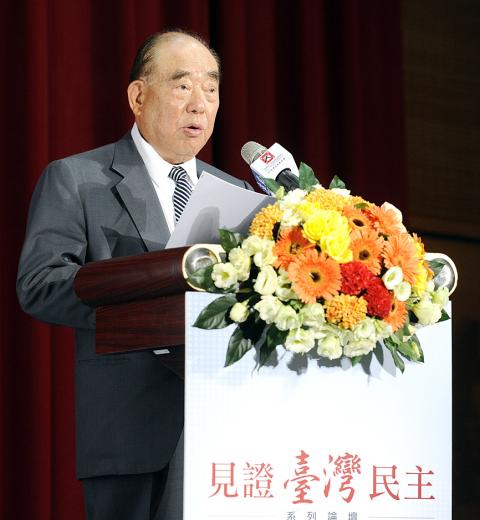|
Taiwan is not sovereign nation:
former premier
By Shih Hsiu-chuan / Staff reporter

Former premier Hau Pei-tsun
addresses the fourth ¡§Witness Taiwan Democracy¡¨ forum organized by the Taiwan
Foundation for Democracy in Taipei yesterday.
Photo: George Tsorng, Taipei Times
Rejecting the term ¡§Taiwan¡¨ as the
nation¡¦s name, former premier Hau Pei-tsun (°q¬f§ø) said yesterday that Taiwan is
not an independent, sovereign nation and that unification between Taiwan and
China would eventually happen.
The assertions ¡§Taiwan is already an independent country named the Republic of
China (ROC)¡¨ and ¡§the ROC is Taiwan¡¨ are both forms of ¡§self-depreciation,¡¨ Hau
said when addressing a forum organized by the government-funded Taiwan
Foundation for Democracy (TFD).
Hau said this kind of rhetoric was a ¡§politically motivated tactic¡¨ aimed at
¡§fooling voters.¡¨
¡§They represented a step backward for democracy and have become major obstacles
to the quality of the nation¡¦s democracy,¡¨ he said.
¡§Former US secretary of state Colin Powell had made it clear [when he was] in
China that Taiwan is not an independent, sovereign country,¡¨ Hsu said.
However, no one in the world would say that the ROC is not a sovereign country,
he added.
Hau was referring to a statement made by Powell during an interview with Phoenix
TV on Oct. 25, 2004, in Beijing saying that ¡§Our [the US¡¦] policy is clear.
There is only one China. Taiwan is not independent. It does not enjoy
sovereignty as a nation, and that remains our policy, our firm policy.¡¨
The state department later explained that Powell had misspoken and said that
there had been no change in US policy toward Taiwan.
Hau was the fourth speaker invited to address the ¡§Witness Taiwan Democracy¡¨
series forum, following former president Lee Teng-hui (§õµn½÷), former vice
president Vincent Siew (¿½¸Uªø) and vice president Annette Lu (§f¨q½¬).
In his speech, the 95-year-old Hau expressed his wish that leaders of younger
generations will devote themselves to improving the quality of democracy in
Taiwan, saying that democracy gives Taiwan an advantage over China to advance
the peace process with China and to bring about cross-strait unification.
¡§There is no democratic country in the world that has two different democratic
systems. When people of both sides of the Strait have a consensus on their
political system, unification will come to fruition naturally,¡¨ he said.
When China stopped shelling Kinmen in 1979, the tragedy of war among Chinese
people was brought to an end, while the lifting of martial law in Taiwan in 1987
marked the end of an era when ¡§political power came from the barrel of a gun,¡¨
Hau said.
When political power does not come from the barrel of a gun and a consensus on a
political system is reached among people on both sides of the Strait, ¡§we will
certainly attain unification,¡¨ Hau said.
Taiwan could have become a base for fostering democracy in China, but the
division among Taiwanese on the issue of national identity has impeded Taiwan¡¦s
democratic development, Hau said.
In response to his speech, Control Yuan President Wang Chien-shien (¤ý«Ø煊), who
also attended the forum, said he has been thinking about the state of Taiwan¡¦s
democracy.
When Taiwan was ruled by former presidents Chiang Kai-shek (½±¤¶¥Û) and Chiang
Ching-kuo (½±¸g°ê), democracy did not thrive as it does now, but the country
achieved an economic miracle, Wang said.
In the following 25 years, since the nation¡¦s leaders were selected by the
public, the country ¡§has been living off its last reserves¡¨ and no one knows
whether the worst is yet to come, Wang said.
Wang said he did not mean that people lived a better life under the rule of
Chiang Kai-shek and Chiang Ching-kuo than they did now.
Soviet leader Joseph Stalin once asked a soldier how the October Revolution has
changed his life and the soldier replied that he used to have two suits of
clothes and then he had just one, Wang said.
¡§Will there be a day in the future when we [Taiwanese] won¡¦t even have a full
suit of clothes but just a pair of pants left?¡¨ Wang said.
|
![]()
![]()
![]()